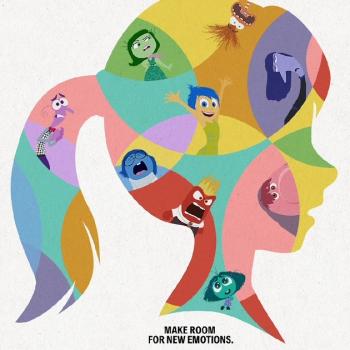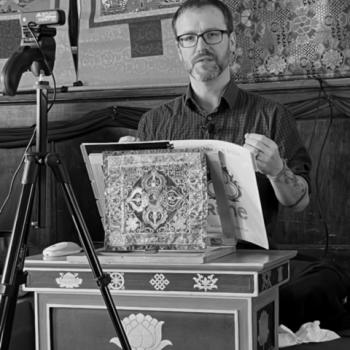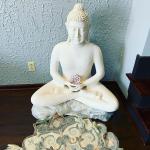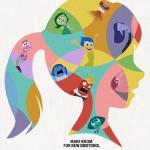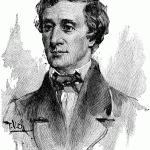Many people develop an interest in Buddhism, but it can be hard to know where to begin.
When I first became interested I resisted going to a temple and meeting other Buddhists for many years. I resisted this because I was worried. I was worried I’d sit in the wrong position in meditation, or pronounce something wrong, or somehow accidentally reveal my lack of knowledge.
I was worried about things I didn’t need to worry about. Buddhists are generally not really judgmental people but also the people you meet in a Buddhist temple are probably paying attention to their own practice and not to you. We tell ourselves stories that keep us from doing things.
In my community, the Rime Center, there’s a hand position we do sometimes called the Mandala Mudra. This is a hand position where you squish your hands together in a very specific way. I’m telling you about this to tell you that I’m certain I don’t do it exactly right and also no one is watching me and no one cares.
This is actually a general fact of life that I think is true: you’re the center of your story. You’re not the center of everyone’s.
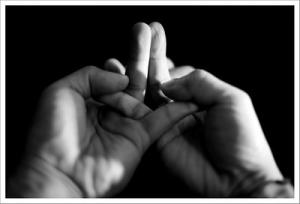
Anyway,
Buddhism. Some people get caught up in this question: “Is Buddhism a religion?”
And I think that question isn’t very interesting. I don’t call it a religion when I talk about it. I call it my faith tradition. But that’s really just because that term sounds better to me. I don’t have a problem with using the word religion. People have strong opinions about this. Generally people who want to say it’s not a religion fall into one of two views.
1) they like their religion and want to keep it, so they are worried about the potential of having another one.
2) they DO NOT like religions. Maybe they had a bad experience, who knows.
More than anything, I think Buddhism is a practice. It’s not something we believe in and it’s not something we are so much as it is something we’re doing.
I practice Buddhism.
Buddhism is a faith tradition that was founded 2500 years ago by a historical figure that we call the Buddha.
Who was the Buddha?
In Buddhism for Beginners Thubten Chodron describes the Buddha as, “A human being who lived 2500 years ago and how cleansed his mind of all defilements and developed all of his potential.”
That sounds really heavy. He fully cleansed his mind and reached his full potential. It sounds like a lot. But this fact is so important to the story. He was a person. He was not a spirit, he was not a god, he was not an angel, he was not a divine hero. He was a person. He was a very wise and determined person, but he wasn’t fundamentally different from you or me. So, we can all do what he did. This is something we can aspire to.
We are encouraged to study the Buddha’s teachings and to try them out. Then we can develop faith in them. We can cleanse our minds and reach our potential.
He saw that the religious traditions of his day were steeped in hostility to science, being mean to minorities, elitism, and sexism. But, more importantly, he didn’t think the religions of his day really tackled the problems of human life.
The purpose of Buddhism, in my opinion, is to help us live the best lives we can for our own happiness and the happiness of others. It’s about human flourishing and reaching our potential. How can we make this world a better place?
That’s the point.
In Buddhism for Beginners Thubten Chodron says, “Abandon negative action; create perfect virtue; subdue your own mind. This is the teaching of the Buddha.”
This really gets to the heart of what we’re trying to do.
Stop doing bad things, do good things, get some control of your mind.
If we can stop doing things that cause harm, then we can make the world a better place for ourselves and others. We can work toward cultivating virtue by learning to develop attitudes that are rooted in love, compassion, joy, and equanimity. When we subdue our minds, we can put down our emotional baggage to see the world clearly and we can start making better choices. This can helps us be calm and peaceful and also to stop making enemies out of everything all the time.
A lot of people come to Buddhism because they’re interested in meditation. I think that’s really good and I think, as Buddhists, we do a great deal of good in the world by teaching people how to meditate. But we would make a mistake if we thought that was everything. Buddhism is about being a whole person.
“Abandon negative action”
In this case, what is negative action? Things that harm ourselves and others. We know what those things are. We know when we’re doing it. Sometimes we want to do things we know are wrong and we do them anyway because we really want to. Living a self centered life doesn’t make us as happy as we think it will. But also doing things that cause harm to ourselves and others causes disharmony with the world around us. And also I really like this quote by Mark Twain, “If you tell the truth, you don’t have to remember anything.” When we make ethical mistakes (and we all do) we sometimes can really run ourselves ragged trying to cover them up. And the truth is many of our most selfish actions only bring fleeting joy anyway.
“Create perfect virtue”
I’m not sure about that word ‘perfect’. But the point is important. Abandoning negative action is about stopping harm that we’re causing. Creating virtue is about helping. Not only do we not want to push people down, but also we want to help them if we can. Doing what we can to help others, living a life of kindness and compassion with a boundless heart, helps create harmony and makes the world a slightly better place for everyone, including ourselves.
“Subdue your own mind”
Meditation is done for this in my tradition, and most traditions. Some branches of Buddhism do other things to subdue their minds, but usually meditation is a component. We are training our minds to learn how to really pay attention, to see the world clearly, and to put down some of our emotional baggage. Our awareness is fractured and a lot of the time we move through life on autopilot. Sometimes we are just doing things and not really being very intentional or authentic in our behavior. We get lost and confused easily. So we are training to make friends with our minds so we can learn how to stop doing that. That helps us make better choices in life. It’s hard to make the right choice when you can’t see your options in a clear way.
That’s really the heart of the matter. This is what we’re doing. I think it’s not accidental that the stuff about being a good person is before the stuff about meditation also. It’s really important to cultivate virtue and if we forget that we could end up in all sorts of trouble. Living in harmony with the world around you matters.
Buddhist teachings are full of lists. I’m going to share some lists with you now. The point of having teachings in a list is it makes them easier to remember when we need to be thinking about them.
There’s a teaching called “The Noble Eightfold Path”. It’s said that getting these areas ‘right’ in your life is what you need to do. Getting these areas wrong in our lives is a thing that gets in our way. There are eight of these and they’re in three categories: ethical discipline, meditation, and wisdom.
Ethical Discipline:
-Right Speech: using words that are true, kind, and appropriate
-Right Activity: taking actions which don’t harm others
-Right Livelihood: obtaining a living through ways that are honest and not harmful
Meditation:
-Right Effort: determination to counteract disturbing and negative emotions
-Right Mindfulness: countering both laziness and excitement in our meditation
-Right Concentration: training our mind to fix one pointedly on an object
Wisdom:
-Right View: the wisdom that realizes emptiness and interconnectedness
-Right Thought: the mind can explain the path clearly to others and is motivated by wishing for freedom from suffering.
These aren’t practiced in sequence, rather they are things for us to just be thinking about and trying to embody in our lives.
It’s also said that there are three things that we really lean on to help us. These are sometimes called “the three jewels”. I like to think of them as “the three refuges”. When we’re struggling these are the things we can turn to for support. We’re relying on these things to guide us and provide us with support.
They are:
1) The Buddha
2) The Dharma
3) The Sangha
The Buddha is that historical figure who founded this tradition, but it is also an idea that represents our own potential.
The Dharma represents these teachings from this tradition that have come down through the ages to help us get through this life and do these practices.
The Sangha is the community, those people we are practicing Buddhism with.
And the thing is, I think some people really want to set aside the Sangha. Many people don’t want to practice with others. I don’t know if that’s introversion or discomfort or something else. But I know that many of the people I talk to who are interested in Buddhism don’t have communities that they practice with. And that’s fine, people can do what they want. But having community support is really important. Being around other people with goals that are similar to ours helps us be more motivated. And having friends that are trying to cultivate these things too probably really helps keep us out of trouble.
I’ll share a quick story.
The Buddha’s assistant Ananda went to him one day and said, “I think having a spiritual friends, a sangha, is so important that it’s half of the path.”
And the Buddha replied, “No, Ananda. Having spiritual friends is the whole path.”
I think about that a lot. There are some great books and articles to read about Buddhism. And of course you can learn how to meditate and start doing that on your own. But if you really want to learn about Buddhism, if you are thinking about being a Buddhist, there is no substitute for being in the room with other Buddhists. So if you’re interested, get out of your comfort zone and go meet up with people.




